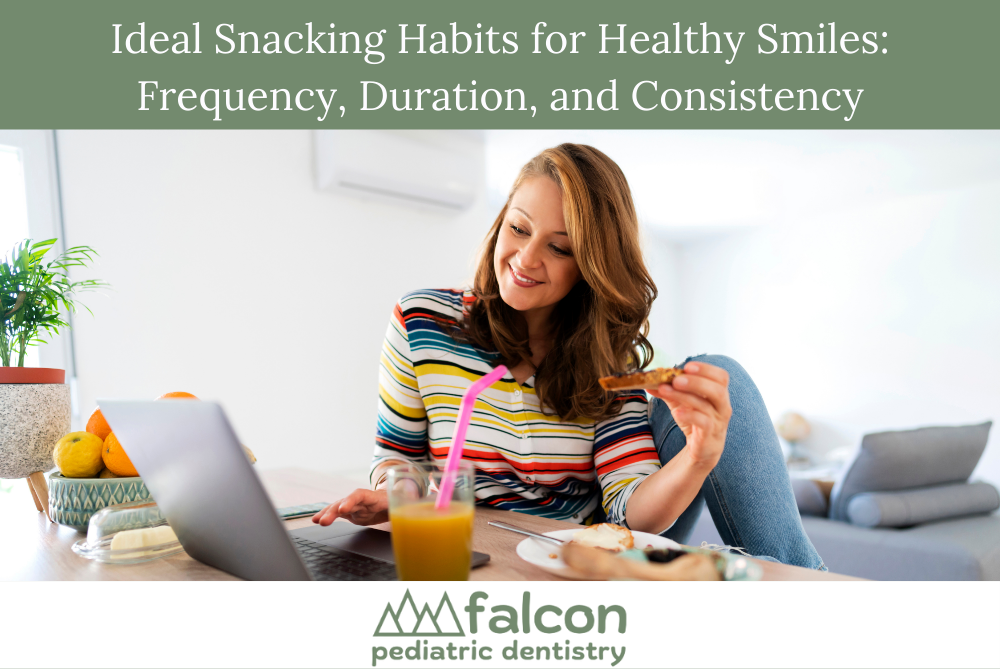
Let’s explore the ideal approach to snacking, with a focus on frequency, duration, and consistency, so you can help your child maintain excellent oral health and avoid preventable issues like cavities and enamel erosion.
Why Snacking Habits Matter
Children love to snack—it fuels their growing bodies and often helps them stay energized between meals. However, frequent or prolonged exposure to sugary or starchy foods can contribute to the development of cavities. When kids snack throughout the day without giving their mouths a break, their teeth are constantly exposed to acids that wear down enamel.
Understanding how snacking frequency, duration, and consistency affects oral health can help you prevent early dental problems.
1. Frequency: How Often Should Kids Snack?
The number of snacks a child eats each day directly affects their risk for cavities. Every time your child eats, bacteria in the mouth produce acids to break down sugars and carbohydrates. More frequent eating = more acid attacks on the teeth.
Ideal Habit:
Limit snacks to 2–3 times per day, and encourage water between meals instead of juice or milk. Offering snacks at set times rather than “grazing” throughout the day allows the mouth time to remineralize and reset.
2. Duration: How Long Are Snacks Lasting?
It’s not just what your child eats—but how long it takes them to eat it. Slowly eating or sipping a sugary drink over a long period increases acid exposure.
Ideal Habit:
Encourage your child to eat snacks in one sitting (about 10–15 minutes) instead of spreading them out. Avoid habits like nursing a juice box for an hour or nibbling on crackers while watching TV. The shorter the snacking window, the better for their teeth.
3. Consistency: What Types of Snacks Are Being Chosen?
Sticky, starchy, or sugary snacks tend to cling to the teeth and are harder to remove—even with brushing. Some foods also break down into sugars in the mouth.
Better Snack Choices:
- Fresh fruits and vegetables (apples, carrots, cucumbers)
- Cheese or plain yogurt
- Hard-boiled eggs
- Whole grain crackers with hummus
- Nuts or seeds (if age-appropriate)
Snacks to Limit:
- Sticky granola bars
- Fruit snacks or gummies
- Cookies, candies, or chocolate
- Chips and crackers
- Soda, juice, or sweetened milk
Choose snacks that are nutrient-dense, low in sugar, and not sticky or slow to dissolve.
Q&A: Snacking and Dental Health
Q: Is grazing throughout the day really that bad?
A: Yes, grazing can keep the mouth in a constant acid state, which increases the risk of tooth decay. The mouth needs time to neutralize acids between meals and snacks. Grazing doesn’t allow saliva to naturally clean the teeth and rebuild enamel.
Q: What’s the best beverage to pair with snacks?
A: Water is always the best option! It helps rinse away food particles, keeps the mouth hydrated, and doesn’t contain sugar. Milk is okay with meals, but avoid sweetened drinks like flavored milks or juice outside of mealtimes.
Q: Are “healthy” snacks like dried fruit or granola bars okay?
A: Even “healthy” snacks can be harmful to teeth if they’re sticky or sugary. Dried fruit and many granola bars cling to teeth and feed cavity-causing bacteria. If your child eats these, encourage brushing or rinsing with water afterward.
Q: Should kids brush after every snack?
A: Brushing twice a day (morning and before bed) is essential. If your child snacks more than once or eats something sugary or sticky, rinsing with water afterward can help. You can also give them a crunchy fruit or vegetable like an apple or carrot to help clean teeth naturally.
Q: How can I encourage better snacking habits?
A:
- Stick to a routine: Offer snacks at set times rather than on demand.
- Prep smart snacks: Keep healthy options like cut veggies or cheese sticks ready to grab.
- Limit screen snacking: Eating while distracted can lead to prolonged snacking.
- Make water fun: Use fun cups or straws to encourage water instead of juice.
Final Thoughts
Smart snacking is just as important as brushing and flossing when it comes to your child’s dental health. At Falcon Pediatric Dentistry, we’re here to guide families toward healthy habits that support strong, cavity-free smiles.
By being mindful of how often, how long, and what your child is snacking on, you can make a lasting impact on their oral—and overall—health.
Visit Us at Falcon Pediatric Dentistry
Have questions about your child’s snacking habits or want to schedule a dental check-up? We’d love to help your child smile brighter!
Falcon Pediatric Dentistry
📍 11555 Meridian Market View
Falcon, CO, 80831
📞 Phone: (719) 749-9001
Visit Our Website falconpediatricdentistry.com
Let’s keep those smiles healthy—one snack (and smile) at a time!
